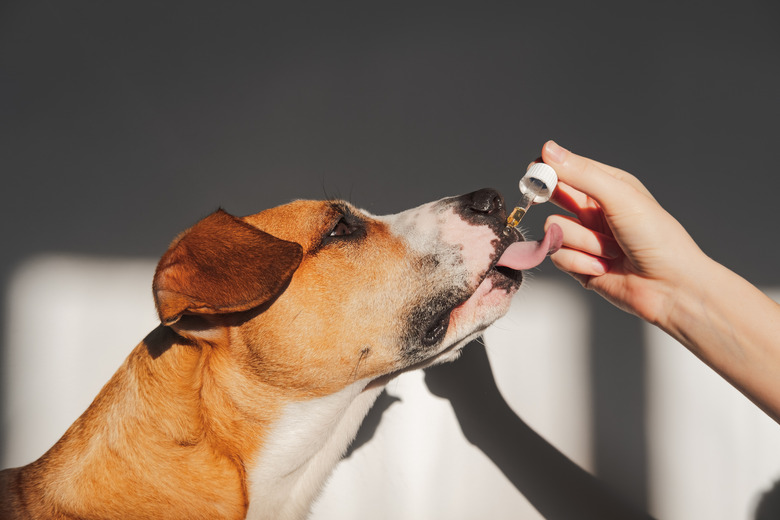How To Give Fish Oil To Dogs
Omega-3 fatty acids don't just have health benefits for humans; dogs can also enjoy some of the same perks. Unfortunately, they can't metabolize flaxseed, linseed, or canola oil like we can. That leaves us fish oil — whether it's a capsule supplement, a whole fish, or liquid fish oil for dogs. In actuality, fish oil is the most potent source of omega-3s and gives a real bang for its buck.
Omega-3s are a group of three important acids: EPA (eicosapentaenoic acid), DHA (docosahexaenoic acid), and Alpha Lipoic Acid (ALA). These all work to reduce inflammation in your dog's body, including in the case of ailments like arthritis, heart disease, kidney disease, dermatitis, diabetes, epilepsy, and more. It can even help fight canine cancer.
Here's a look at how you can give your dog fish oil, from the proper fish oil for dogs dosage to the most common fish oil for dogs side effects.
Fish oil for dogs dosage
Fish oil for dogs dosage
Like you'd expect, the recommended fish oil for dogs dosage is a bit different than the recommended dosage for a human. It depends on the dog's size, nutritional needs, and whether you're trying to cure an ailment or supporting general health. This is why it's important to consult a vet and follow their guidance. They will cater treatment to your dog, and in some cases, advise you to avoid fish oil altogether. It is not suitable for certain pups with preexisting health conditions.
In general, some vets will recommend that your dog gets 75 to 100 mg/kg total EPA and DHA, but others will recommend less. The maximum daily fish oil dosage for dogs is 310 mg/kg.
Liquid vs. capsule fish oil
Liquid vs. capsule fish oil
The easiest way to give your dog fish oil is to use a liquid supplement or capsule. These are available online, from your vet, or in most pet stores. You can even purchase a supplement from your local pharmacy or drugstore, as long as you make sure that it's not mixed with other ingredients that can harm a pup. There are three basic kinds:
- Natural triglyceride oil, which is easiest to absorb but may contain contaminants because it's not purified.
- Ethyl ester oil, which is concentrated and purified.
- Synthetic triglyceride oil, which is the hardest to absorb.
Both liquid and a capsule can be given directly to your dog, providing he's willing to eat medicine. Some pups may reject a capsule outright, while others won't notice if it's hidden in a wad of peanut butter. If your pet is particularly fussy, you can mix liquid fish oil for dogs (either from a dropper or punctured capsule) with some wet food. This is actually a great option because fish oil can cause stomach upset on an empty stomach. Remember to measure liquid fish oil carefully, as it's easy to accidentally add too much.
Cooked fish for omega-3s
Cooked fish for omega-3s
You don't have to use a supplement to give your dog an added boost of omega-3 fatty acids. You can just give him the whole fish. Cooked salmon, cod, anchovies, and sardines are excellent sources of natural fish oil. You want to choose fish with shorter lifespans since those with longer lifespans like tuna and swordfish contain higher amounts of heavy metals like mercury. Mercury from fish can cause metal toxicity, so be mindful of how much you're feeding your pup.
Before giving your dog fish, consult your vet on the proper portion. Like all foods, eating too much fish can lead to obesity. When you're ready to prepare your fish, you can boil it, steam it, grill it, or bake it. Whichever the cooking method, make sure to remove all the bones, which are the biggest risk to your dog's health and safety. Do not add spices, and heed caution when adding fish to your dog's raw diet since raw food can cause illness in both humans and dogs.
Fish oil for dogs side effects
Fish oil for dogs side effects
Fish oil for dogs side effects are minimal if taken in the proper dose — but remember, your dog may be already getting fish oil from elsewhere in his diet. Many dog foods contain fish meal or are fortified with omega-3s. In this case, adjust your dog's dosage. Additionally, fish oil may not be a good fit for dogs who have gastrointestinal issues or medical conditions that make them prone to bleeding.
As a rule, always consult your vet before giving your pup any kind of supplement. At the wrong dose, fish oil can cause troubling side effects like vomiting, diarrhea, altered platelet function, altered immune function, delayed wound healing, and weight gain. Yes, it is possible for a dog to overdose on this type of supplement.
If you think your pup consumed too much fish oil (whether he accidentally got a hold of the whole bottle you left on the kitchen counter or not) call the ASPCA's Animal Poison Control Center at 888-426-4436 or consult an emergency vet.
Always check with your veterinarian before changing your pet's diet, medication, or physical activity routines. This information is not a substitute for a vet's opinion.
References
- Vet.Tufts.edu: Omega-3 Fatty Acid Supplementation for Dogs and Cats with Heart Disease
- VCA: Fish Oil
- CARE: How much Omega 3 fatty acids should I give my dog?
- American Kennel Club: Fish Oil for Dogs
- American Kennel Club: Can Dogs Eat Fish?
- U.S. Food and Drug Administration: Get the Facts! Raw Pet Food Diets can be Dangerous to You and Your Pet
- ASPCA: Animal Poison Control


